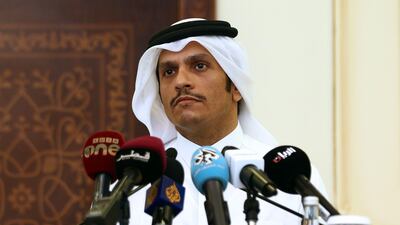On Tuesday, Qatar's foreign minister flung a challenge at the four Arab states that have been striving for three months to resolve the regional crisis precipitated by Doha. "Put up your claims and put up your evidence", said Sheikh Mohammed bin Abdulrahman Al Thani to Saudi Arabia, Egypt, Bahrain and the UAE. This was a performance staged not in the interests of resolving the problem but to project Qatar as an innocent victim of its neighbours.
As he knows all too well, the quartet supplied incriminating evidence against Qatar more than three months ago. Had Qatar complied with the quartet's demands to end its policies of sponsoring terrorism and destabilising the region, there would be no crisis today. But rather than introspect and change course, Qatar elected to blame its neighbours.
In spite of being at the receiving end of Doha's actions, the quartet chose to honour the bonds of kinship that date back centuries by keeping the dispute within the GCC. Qatar, it is sad to see, never felt obliged to uphold these ties. On Wednesday, we learned that Qatar was complicit in attempts to overthrow the government of Bahrain in 2011. Sheikh Hamad bin Jassem, Qatar's prime minister at the time, engaged in clandestine telephonic talks with the leader of Bahrain's largest opposition group and encouraged him flood the streets with protesters and escalate unrest in the country. Qatar then deployed its broadcasting arm, Al Jazeera, to magnify the protests.
________________
Read: Qatar crisis: What you need to know
________________
“Interference” doesn’t fully convey the enormity of Doha’s actions, which were orchestrated to sow discord, promote instability and, ultimately, bring down the government of a fellow Arab Gulf country. Bahrain has reacted to the revelations with sorrow rather than anger at Qatar. Its mood is increasingly shared by people across the region. They can see that Doha, in thrall to Iran, has been trampling on its own.
Recent reports that a hefty donation given by Qatar to an Indian charity made its way to groups with terrorist links are further evidence of the global footprint of the policies that the Arab quartet wants Doha to curb. As Dr Anwar Gargash, the UAE’s Minister of State for Foreign Affairs, told reporters after his visit to India last week, “Qatar is a small, but wealthy, state using its financial means to support terrorism”.
________________
Read more on the Qatar crisis:
The profound ideological clash at the heart of the rift between the Gulf and Qatar
How France ransomed itself to Qatar's money and 'soft power'
________________
Qataris are suffering the consequences of their government's actions. On Wednesday The National detailed the economic cost of Doha's refusal to change course. Construction works, unable to import materials, have halted; aircraft, unable to fly to neighbouring countries, are collecting dust; growth in the non-oil sector is slowing. Having quietly reduced the stake of its sovereign wealth fund in Credit Suisse, Qatar is holding talks to raise money by floating a bond and is poised to post a fiscal deficit. It is within Qatar's power to end this nightmare.
Follow The National’s Opinion section on Twitter

